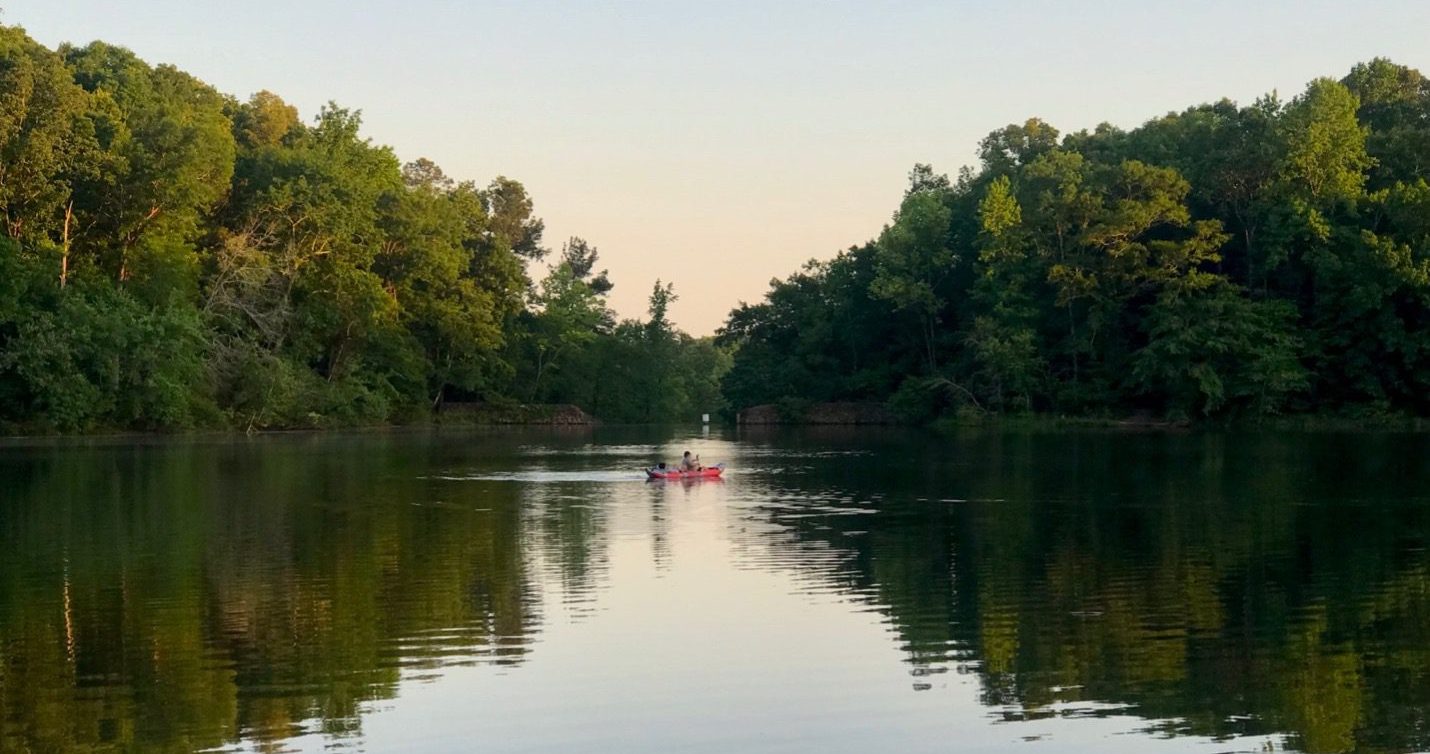Fish & Water

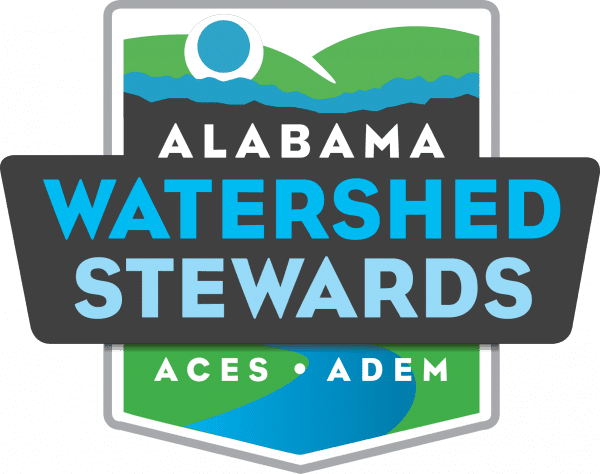
Alabama deserves cities and towns that are resilient, livable, productive, and sustainable. That all begins with clean water.
Watershed Stewards at Auburn University provides both educational outreach and on-the-ground projects that encourage the adoption of water management strategies that benefit the community, the economy, and the environment.
What is Alabama Watershed Stewards?
Alabama Watershed Stewards (AWS) is a science-based outreach program from the Alabama Extension Water Program and the Auburn University Water Resources Center. The center promotes healthy watersheds, increases understanding of water pollution, and provides the knowledge and tools to approach water as a community asset.
Through various workshops and educational materials, AWS offers a platform for local decision makers, organizations, and city officials to come together in imagining the future of their city’s waterways, and to take action to protect and plan for those resources.
AWS workshops include one-day watershed stewardship workshops, one-day watershed planning workshops, technology transfer workshops, and hands-on projects such as rain garden installations.
Program Offerings
Alabama Watershed Stewards hosts several types of trainings, each intended to promote healthy watersheds, foster community conversations, and provide people with the tools they need to prevent and resolve local watershed issues. View upcoming events by visiting the Alabama Extension calendar and searching watershed. The following are various workshops offered through AWS Program.
1. Alabama Watershed Stewards Workshops
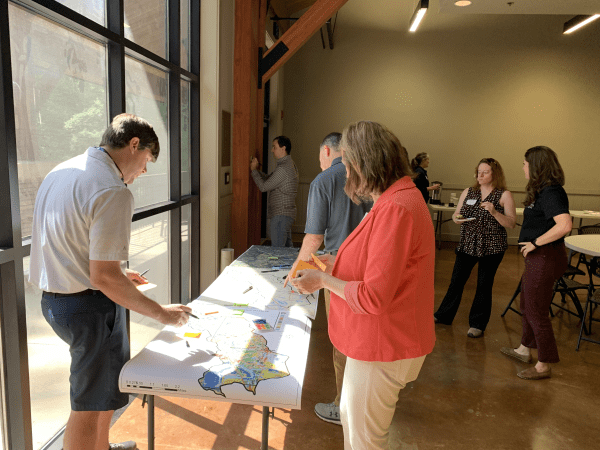
Alabama Watershed Stewards workshop participants discussing their local watershed.
These one-day in person trainings across the state focus on specific watersheds that currently have waterways in need of community care.
What you’ll learn. These workshops invite local leaders and members of the water community to share their experiences, identify local challenges and opportunities that can benefit the community, the economy, and the environment. This program offers a platform for local decision makers, organizations, and city officials to come together in imagining the future of their city’s waterways, and to take action to protect and plan for those resources.
What you’ll do. Listen to talks from other participants, engage in discussions and small projects. Participants gain practical information about local watersheds groups, partnerships possibilities, and project funding opportunities.
Agenda Example
- 8:30 a.m. – Sign in
- 9 a.m. – Welcome and Program Introduction
- AU Water Resources Team
- 9:15 a.m. – Overview of Watershed Systems
- AU Water Resources Team
- 10:10 a.m. –Understanding the State of Your Watershed
- 11:45 a.m. – Catered Lunch
- 12:30 p.m. – Improving Watersheds – What Can We Do?
- 2:30 p.m. – Community Discussion
- 3 p.m. – Upcoming Events and Closing Comments
How it Works
Registration is done online at http://aub.ie/alabamawatershed. These workshops are open to the public, and locations vary across the state. There is a $20 registration fee, which covers lunch and a copy of the Alabama Watershed Stewards Handbook. There are 0.65 Continuing Education Units available for those who complete the training.
2. Watershed Management Planning Workshops
 Watershed planning is a voluntary integrated approach to responsible resource management by considering the watershed as a whole. These one-day, in-person workshops introduce the process of watershed planning for communities as a voluntary way to plan for a community’s water future and gain opportunities for project funding.
Watershed planning is a voluntary integrated approach to responsible resource management by considering the watershed as a whole. These one-day, in-person workshops introduce the process of watershed planning for communities as a voluntary way to plan for a community’s water future and gain opportunities for project funding.
What you’ll learn. Watershed planning involves four aspects; 1) identifying and prioritizing water quality challenges in the watershed, 2) developing increased public involvement, 3) coordinating activities with other agencies, and 4) measuring success through increased and more efficient monitoring and other data gathering. In this watershed planning workshop you will learn about the following:
- Watershed planning – what it means and how it works
- The basics of watershed management
- Challenges and opportunities in your community
- Funding opportunities related to watershed planning
- How to leverage water resources and community development
- Priorities and next steps
What you’ll do. Listen to presentations from others in the region working on watershed planning and work with local community members on identifying opportunities you’re your own watershed.
How it Works
Taking a watershed approach represents the awareness that restoring and maintaining Alabama’s waters requires crossing traditional barriers (point vs. nonpoint sources of pollution, county boundaries) when designing solutions. These solutions increasingly rely on participation by both the public and private sectors, where residents, elected officials, and technical personnel all have opportunity to participate. This integrated approach mirrors the complicated relationships in which people live, work, and recreate in the watershed and also suggests a comprehensive, watershed-based, and community-based approach is needed to address these.
Registration is done online at http://aub.ie/watershedmanagement. These workshops are open to the public, and locations vary across the state. There is a $20 registration fee, which covers lunch and a copy of the Alabama Watershed Stewards Handbook. There are 0.65 Continuing Education Units available for those who complete the training.
3. Partnership with Alabama Water Watch Water Monitoring
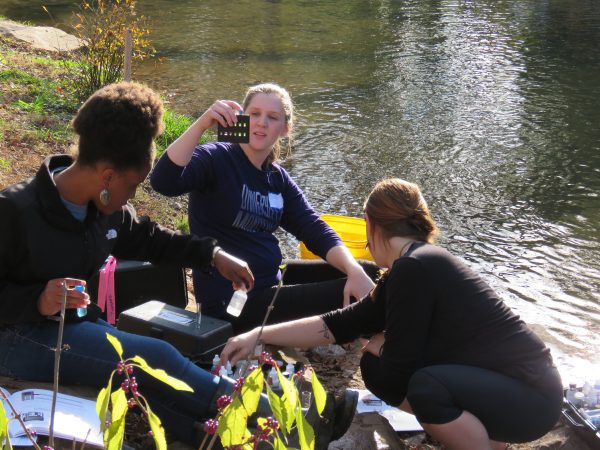
Alabama Water Watch volunteers collecting water samples.
How can people know if their waterways are healthy or if water quality is improving or degrading? Residents have the opportunity to become water monitors of their local streams, joining a statewide network of citizen scientists that help keep track of water quality changes over time. Tracking water quality helps identify unexpected issues or concerns in a watershed and can provide an awareness of ways to improve water quality.
What you’ll learn. Learn how to use the Alabama Water Watch (AWW) monitoring methods to begin monitoring local waterways on your own.
What you’ll do. Participate in an online course to learn the basics, then meet with the AWW team to walk through the steps of citizen-science water quality monitoring.
How it Works
Registration is done online at https://aaes.auburn.edu/alabamawaterwatch/events/. Check the Alabama Water Watch website for upcoming training opportunities.
4. Alabama Watershed Stewards Online Course
This free, online, self-paced course introduces you to the basics of water quality, watershed health, and ways to get involved. Offered year round, this self-paced course will give you a foundational knowledge about watersheds, non-point source pollution, and ways to protect water quality. The course mimics the outline of the Alabama Watershed Stewards Handbook, available online.
What You’ll Learn
- Basics of watershed systems
- Causes of watershed impairments
- How to use best management practices
- How communities make a difference
What You’ll Do
- Complete course videos and quizzes
- Make connections across various fields to see how they impact water quality
- Learn about how you personally can get involved
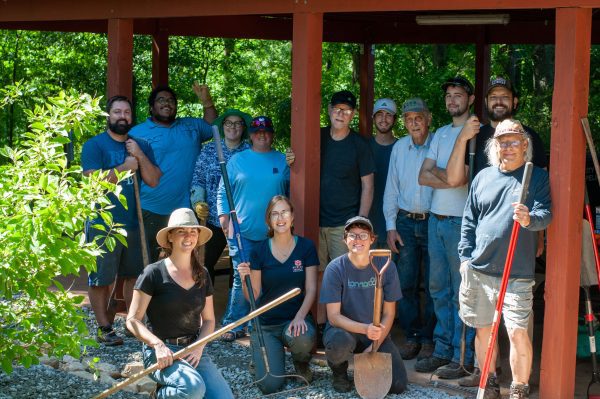 How it Works
How it Works
Registration is done online at https://aub.ie/awsonline. The course is self-paced so that you can log in for up to six months. The course takes roughly one hour per day for five days to complete. There are .7 Continuing Education Units available for those who complete the training.
5. Special Training Topics
AWS offers special trainings such as technical transfer workshops on green infrastructure, grant writing basics workshop for environmental groups, and rain garden design workshops. Check the Alabama Extension calendar for upcoming events.
Learn More
Want to learn more? To find upcoming events, workshops, and other learning opportunities, visit the Alabama Extension calendar. Stay up-to-date by subscribing to the Alabama Watershed Stewards Newsletter. For questions or for more information, contact stewards@auburn.edu.
Watershed Stewardship Resources
- Alabama Watershed Stewards Handbook
- How to Install a Rain Garden
- A Homeowner’s Guide to Rainwater Harvesting in Alabama
- About Watershed Planning
- Agricultural Best Management Practices for Water Quality
- Alabama Watershed Stewards Videos
- Everyday Water Conservation
- Guide to Harvesting and Planting Live Stakes for Stream Restoration
- Pet Waste and Water Quality
- Planning and Conducting a Litter Pickup
- Soil Testing Protects Water Quality
- The Basics of Water Quality
- Water Quality Best Management Practices
- Water Use in Alabama
- What is a Watershed?
These and other resources are available under the Water Resources and Watershed Stewardship sections of the Alabama Extension website.
Project Partners
This educational training was developed by the Alabama Cooperative Extension System in partnership with the Alabama Department of Environmental Management, the U.S. Environmental Protection Agency, and other agencies including Alabama Water Watch with the Auburn Water Resources Center. This project was fully funded by the Alabama Department of Environmental Management through a Clean Water Act Section 319(h) nonpoint source grant provided by the U.S. Environmental Protection Agency – Region 4.


